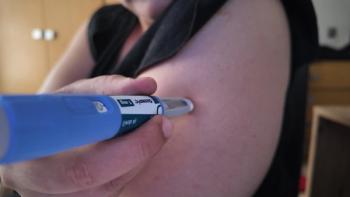
Older Cancer Survivors Struggle to Cope During the COVID-19 Pandemic
Survivors of cancer go through coping during the first year after treatment and require specific resources. But these were limited due to the pandemic resulting in survivors self-coping with known mechanisms.
Survivors of cancer who recently finished treatment and are at least 60 years of age struggled with coping during the COVID-19 pandemic, which may highlight the need for the development of a remote-access resource for coping during this pandemic.
“We all know that in 2020, COVID-19 affected numerous people around the globe, and the World Health Organization acknowledged that those who are the most vulnerable to the negative effects of COVID-19 are those who are older than 60 years of age,” said Jacqueline Galica, RN, PhD, CON(C), nurse scientist at Queen’s University in Kingston, Ontario, Canada, during the presentation at the virtual Oncology Nursing Society Congress. “And given that nearly 9 out of 10 cancer diagnoses occur among people who are older than 60 years of age means that this group is an important group to study during the pandemic.”
After the first year of treatment, survivors have many needs and require resources for support, including psychological and informational support. This is especially true for those over the age of 60 because of other comorbidities they might have. Due to the COVID-19 pandemic, these resources were limited to these patients. Researchers sough to see how this population who completed treatment in the last year were coping during the pandemic.
Researchers interviewed 30 participants (56.7% women, mean age, 72 years). According to the presentation, questions asked of these participants included:
- How does the COVID-19 pandemic affect their access to formerly used and/or desired resources/supports?
- What coping recourses are they using during the pandemic?
- How do these resources help (or not) to meet their cancer-related care needs?
- What are their reflections on the pandemic? What are their suggestions for suitable resources and delivery methods when traditionally offered resources are limited or unavailable?
Results showed that survivors were initiating coping mechanisms on their own including acceptance (29 participants, 96.7%), self-distraction (28 participants, 93.3%) and taking action (28 participants, 93.3%). Participants also reported using instrumental (26 participants, 87%) and emotional support strategies (25 participants, 83.3%).
During the analysis, the researchers found interconnected themes in the population such as drawing on lived experiences, redeploying coping strategies and complications of cancer survivorships in a pandemic.
Drawing on lived experiences meant survivors were using coping strategies that they had already known about through pasts illnesses or through someone they knew who had a past illness, as well as other life experiences such as work, specifically those who had a background of knowledge in health.
The second theme seen was redeploying coping strategies, meaning they were not new. Participants continued on their way of life during the pandemic or “even magnified their formally used strategies during the pandemic,” said Galica. Participants also reported taking up new and old activities to keep them distracted from their concerns.
The last was complications of cancer survivorships in a pandemic. “Sometimes cancer survivors observed a dissonance between the coping strategies that were available to them versus those that were familiar. And this made it challenging for them to cope with their cancer-related concerns,” said Galica. This was seen specifically in participants who still experienced side effects that affected their ability to engage in former activities that they enjoyed; some either modified expectations or stopped altogether.
Participants had 4 general recommendations for future care. The first being enhanced baseline information, meaning given more knowledge in the beginning from their oncology team to prepare for self-management if there were to be an interruption in care. Secondly, participants reported that changes in visitor care was a concern. Thirdly, older patients acknowledged the need for technology integration and felt it could be used more and less in certain settings. Lastly, participants valued the use of masks and other personal protection equipment and felt it increased awareness to help protect people who are vulnerable to a common cold or the flu even after this pandemic.
Implications of this study include that clinicians can use a strength-based approach in survivors as they draw from their past experiences. Also, the need to enhance resources to support coping, specifically using remote methods when patients cannot attend and in person session during a pandemic or not.
Limitations of the study include not collecting data on functional status, timing of recruitment (the summer allowed participants to get out and enjoy outdoor activities) and response bias.
Reference
Galica, J. Haase, K. Liu, Z. How older cancer survivors are coping amid the COVID-19 pandemic: A mixed-methods study. Presented at: Oncology Nursing Society 46th Annual Congress. April 20, 22, 27 & 29 2021. Virtual.
Newsletter
Knowledge is power. Don’t miss the most recent breakthroughs in cancer care.


































